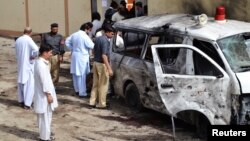QUETTA, PAKISTAN —
A Taliban suicide bomber killed 30 people at the funeral of a policeman in Pakistan on
Thursday, including five senior police officers, in the third deadly attack on government targets in two weeks.
A Reuters reporter at the scene in the western city of Quetta described chaos as injured police struggled to carry bloodstained colleagues into ambulances.
"They are not Muslims. They are not humans," Inspector General Mushtaq Sukhera said. "We have no other option but to fight against terrorists," he added. "We have made sacrifices and we will continue to do so and we will not bow down."
At least 30 people were confirmed dead and 62 wounded, BabarYaqoob Fateh Mohammad, the provincial chief secretary, said.
Twenty-one of the dead were police officers, Sukhera said. Others had not been identified, but children attending the funeral were among the dead and wounded, Mohammed said.
Fayyaz Sumbal, the deputy inspector general of operations for Quetta, was among those killed.
The Taliban claimed responsibility.
"We killed the station-house officer and then we targeted the funeral to kill the other officers," Taliban spokesman Shahidullah Shahid said.
He said the Taliban carried out the attack in revenge for the arrest and mistreatment of their fighters.
Quetta, the provincial capital of Baluchistan, is home to many militants, including the Taliban, sectarian groups and separatist fighters.
The explosion, at a supposedly secure location in one of Pakistan's most heavily militarized cities, again called into question the ability of the security services to defend themselves and curb the escalating insurgency.
The Quetta attack was captured live on television as cameras broadcast mourners and journalists scrambling away from the mosque. Weeping policemen wandered among the blood and body parts, looking for colleagues, or sat in shock amid abandoned shoes and other belongings.
The suicide bomber was wearing a jacket packed with ball bearings and shrapnel, a member of the bomb squad said. The bomber had tried to enter the mosque where senior officers lined up to offer prayers for their colleague, who was gunned down earlier on Thursday. But he was stopped by police and detonated his explosives just outside the mosque, several witnesses said.
It was not yet clear how the bomber had passed through several other layers of tight security.
Pakistan has been hit by a wave of attacks since the government of Prime Minister Nawaz Sharif came to power after a May election.
On July 24, militants bombed military intelligence headquarters in the city of Sukkur and fought a gunbattle with security forces for more than an hour, killing seven and
wounding at least 40.
Last week, more than 100 militants attacked a prison in Dera Ismail Khan freeing 250 prisoners, including Taliban commanders.
In Afghanistan on Thursday, a bomb planted in a graveyard killed 14 women and children, many of them picnicking at the graveside of a family member during the Muslim Eid al-Fitr holiday, officials said.
Thursday, including five senior police officers, in the third deadly attack on government targets in two weeks.
A Reuters reporter at the scene in the western city of Quetta described chaos as injured police struggled to carry bloodstained colleagues into ambulances.
"They are not Muslims. They are not humans," Inspector General Mushtaq Sukhera said. "We have no other option but to fight against terrorists," he added. "We have made sacrifices and we will continue to do so and we will not bow down."
At least 30 people were confirmed dead and 62 wounded, BabarYaqoob Fateh Mohammad, the provincial chief secretary, said.
Twenty-one of the dead were police officers, Sukhera said. Others had not been identified, but children attending the funeral were among the dead and wounded, Mohammed said.
Fayyaz Sumbal, the deputy inspector general of operations for Quetta, was among those killed.
The Taliban claimed responsibility.
"We killed the station-house officer and then we targeted the funeral to kill the other officers," Taliban spokesman Shahidullah Shahid said.
He said the Taliban carried out the attack in revenge for the arrest and mistreatment of their fighters.
Quetta, the provincial capital of Baluchistan, is home to many militants, including the Taliban, sectarian groups and separatist fighters.
The explosion, at a supposedly secure location in one of Pakistan's most heavily militarized cities, again called into question the ability of the security services to defend themselves and curb the escalating insurgency.
The Quetta attack was captured live on television as cameras broadcast mourners and journalists scrambling away from the mosque. Weeping policemen wandered among the blood and body parts, looking for colleagues, or sat in shock amid abandoned shoes and other belongings.
The suicide bomber was wearing a jacket packed with ball bearings and shrapnel, a member of the bomb squad said. The bomber had tried to enter the mosque where senior officers lined up to offer prayers for their colleague, who was gunned down earlier on Thursday. But he was stopped by police and detonated his explosives just outside the mosque, several witnesses said.
It was not yet clear how the bomber had passed through several other layers of tight security.
Pakistan has been hit by a wave of attacks since the government of Prime Minister Nawaz Sharif came to power after a May election.
On July 24, militants bombed military intelligence headquarters in the city of Sukkur and fought a gunbattle with security forces for more than an hour, killing seven and
wounding at least 40.
Last week, more than 100 militants attacked a prison in Dera Ismail Khan freeing 250 prisoners, including Taliban commanders.
In Afghanistan on Thursday, a bomb planted in a graveyard killed 14 women and children, many of them picnicking at the graveside of a family member during the Muslim Eid al-Fitr holiday, officials said.




